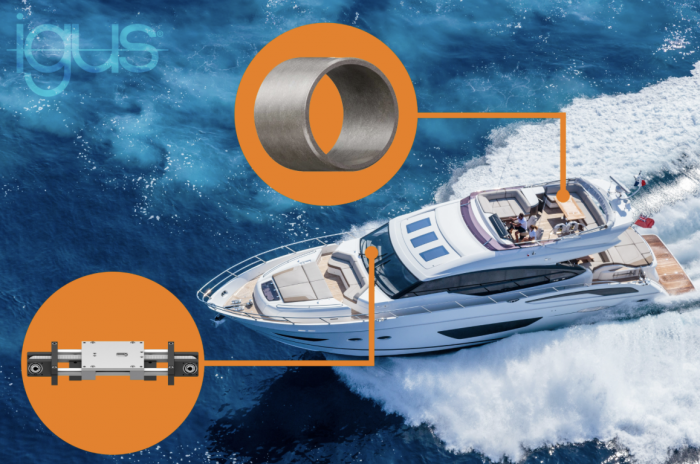igus: Robust in wind and waves: Durable polymers excel in yachts.

Summer is vacation time, and those lounging on the beach often gaze at a sea dotted with boats and yachts. To keep these vessels corrosion-free and low-maintenance, components that withstand harsh weather conditions are essential. For years, parts like plain bearings, linear guides, and drive technology from the plastics specialist igus have proven their worth under the tough conditions of sea air and saltwater.
High-performance plastic plain bearings are found in the mechanisms of doors, adjustable seats, tables, and beds. These small components are far from trivial, helping shipbuilders solve multiple problems at once. Take the hinges of a door leading to the deck, for example. Traditional metal bearings quickly reach their limits here—they tend to corrode in contact with sea air and saltwater and attract dirt due to the necessary grease, leading to an unsightly and sticky mess that hampers the door’s operation. Because of these issues, more and more shipbuilders worldwide are switching to igus plain bearings made from high-performance plastics.
Robust polymer bearings withstand the constant up and down of the waves
A small investment with a big impact, as proven by Lethe Exterior GmbH from Bremen. The company develops exterior doors for yachts over 70 meters long, designed to withstand high water pressure in an emergency while being fire-resistant. This means the bearings in the door bolts are subject to high loads on a very small surface area. While this might seem like a job for metal, Lethe chose igus polymer bushings made from the iglidur G material, which is seawater-resistant, corrosion-free, highly durable, and offers excellent sliding properties. Crucially, these bearings require no lubrication, not just for aesthetics but also for functionality. Embedded solid lubricants in the material release during operation, enabling smooth dry running without external lubrication. ‘Our polymer bearings are not only seawater-resistant and durable but also maintenance-free, and they help protect the environment by preventing grease or oil from polluting water and soil,’ explains Lars Butenschön, head of iglidur plain bearings at igus. Another advantage is that since iglidur G plain bearings are part of the standard product range, they are quickly available and cost-effective.
igus linear and drive technology also optimize yacht window regulators
But igus components are not only found in the mechanisms of seats, tables, and doors but also in yacht windows. For instance, Glaskeil from Würzburg, a company specializing in ready-to-install and customized glass products for yacht construction, has built an automatic window regulator using a linear guide system from igus. The heart of the solution is drylin ZLW toothed belt axes, mounted on the left and right along the window frame’s longitudinal bars. With an installation height of just 31 millimeters, the toothed belt axes are particularly compact, making them ideal for light adjustment and positioning tasks in confined spaces. The belt, made of neoprene reinforced with fiberglass, runs down the center of the rail and is driven by a drylin E series DC motor. The DC motor is also space-saving with a flange dimension of 42 millimeters, as it operates without a motor flange, coupling, or complex external power electronics. It’s durable across a wide temperature range from -10°C to +60°C. Thanks to the lightweight construction using plastic and aluminum and their low inertia, the ZLW series toothed belt axes are quiet and highly efficient. They are also easy to control with a simple stepper motor controller that is reliable, cost-effective, and user-friendly. Therefore, Glaskeil uses the dryve D5 motor controller, which enables quick commissioning. With both igus linear and drive technology and plain bearings, users receive a durable solution that withstands aggressive saltwater and extreme temperature fluctuations.
For more information, please visit: https://www.igus.com
News Categories
- » NEWS HOME
- » Automation & Robotics
- » Industry 4.0
- » Material Handling
- » Sensors
- » Quality & Testing
- » Machine Vision
- » Laser & Optics
- » Metalworking
- » Motion Control & Drives
- » Hydraulics & Pneumatics
- » Process Industry
- » Renewable Energy
- » Agriculture
- » Home & Office Furniture
- » Additive Manufacturing
- » Environmental Tech




